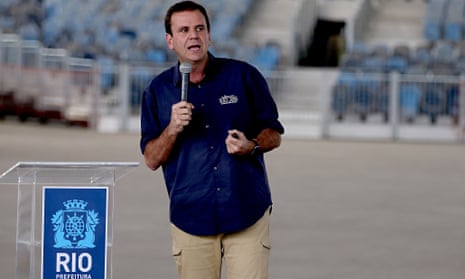The Rio mayor, Eduardo Paes, launched a feisty defence of Olympic preparations on Wednesday as the host city marked the one-year countdown to the 2016 Games with a presidential gala and a test rowing event.
Following criticisms of water quality, police violence, forced relocations and excessive benefits to private developers, the mayor countered with a positive vision of how Rio was transforming as a result of the Games.
“I’m doing what mayors before me promised but didn’t deliver,” he told reporters at a press conference in the fencing venue of the Olympic Park. “Don’t come here wanting Swiss, Swedish or Danish levels of development, we are not there – but we have advanced a lot in recent years.”
His primary boast was that stadium and infrastructure construction was ahead of schedule and below budget. The main Olympic Park is reportedly 82% complete, the Olympic stadium at 79%, the golf course at 98%, the athletes’ village at 89% and the aquatic stadium at 81%. Further back are the velodrome, tennis centre and youth arena but the mayor said they and all other facilities would be ready.
He said Rio was “trying to create a cultural legacy where things can be done on time. We are very proud that with one year to go we are on time. Brazil is not a country where everything is delayed and over cost. It is on time and delivered more cheaply than in the bid.”
He admitted Rio had broken its promise to clean the city’s water in time for the Olympics. According to the bid, 80% of the streams and sewers flowing into Guanabara Bay – the site of the sailing events – were supposed to have been treated by 2016. The current level is only about 50%, though, and is unlikely to improve significantly before the opening ceremony on 5 August 2016.
Studies have found extremely hazardous levels of viruses in the waters of the bay, the lagoon – where the first rowing test event takes place from on Thursday – and off Copacabana beach, which will be the site of the triathlon.
Following the revelations, several national Olympic committees are carrying out their own water monitoring operations. The head of World Rowing said on Tuesday he will ask for viral testing at the lagoon.
“If there is a problem, we will react. It’s our moral duty,” Matt Smith, the chief executive of the organisation said.
Several nations have dropped out of events because of concerns, according to the head of the Rio 2016 organising committee, Carlos Nuzman. He did not specify which countries but he said the venues would be safe for athletes.
He claimed reports of water problems had been proven exaggerated because athletes at test events said they saw fish while they were swimming. This, he said, was “a conflict of information” with the dire headlines about unhealthy water.
Paes also countered criticisms that the private investors in the Games are benefiting disproportionately. He said many areas of the city were being upgraded. Thanks to Games related developments, he said the proportion of people using mass transit – buses and metro – had increased from 16% to 63%. A development consortium, including the landowner Carvalho Hosken, will sell off the athletes’ villages after next August and get the rights to build on 40% of the Olympic Park site – but Paes said this was justified because in return they had paid 75% of the costs of stadium construction.
This was little consolation to the residents of the nearby Vila Autódromo community, some of whom are being forcibly relocated to make way for the development. “It’s very clear. They are just using the Olympics to get rid of us so they can make a profit from housing for the rich,” said Inalva Mendes Brito, who moved out last month.
In a nearby venue on Thursday, the IOC and local government will host a gala to mark the one year countdown attended by the Brazilian president, Dilma Rousseff, and the IOC chief, Thomas Bach.
Bach was due to attend the press conference at the Olympic Park on Wednesday morning but the mayor said he was unable to do so because he was tired after a long journey and a caipirinha the previous night.
